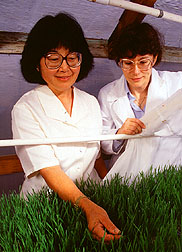This page has been archived and is being provided for reference purposes only. The page is no longer being updated, and therefore, links on the page may be invalid.
Putting the Squeeze on Hay Bales -- and BugsBy Marcia WoodMarch 2, 1998 Compact bales of American-grown hay are moving more swiftly through dockside agricultural inspections in Japan and then on to dairy cows, beef cattle and racehorses. Meanwhile, U.S. growers are spared the higher costs of shipping bulky, standard-size bales. That's because scientists with the Agricultural Research Service developed a procedure to ensure that compressed bales of timothy, alfalfa, oat, bermudagrass or sudangrass hay do not have pesky Hessian flies hiding inside. Japan wants to remain free of Hessian flies. U.S. growers export about $240 million worth of hay to Japan every year. Farmers in every state raise the crop, but those in Arizona, California, Idaho, Nevada, Oregon, Utah and Washington are the most frequent hay exporters to Japan. Compressed bales are about the same weight as conventional bales, but only one-third the size. They're becoming increasingly popular with shippers--and anyone else who doesn't like toting the bulkier traditional size bales. ARS tests with more than 630,000 laboratory-reared Hessian flies showed that compressing bales with 1,136 pounds of pressure per square inch will squash any Hessian flies concealed in a stray wisp of wheat or bit of weed. Fumigating with hydrogen phosphide for 7 days at 68 degrees Fahrenheit provides an extra measure of pest control. Victoria Y. Yokoyama led the tests at ARS' Commodity Protection and Quarantine Insect Research Unit, Fresno, Calif. Fumigating hay bales to rid them of insect stowaways isn't new. But Yokoyama's tests are the first to win Japan's okay of a multiple-treatment process for compressed bales. An article about compressed hay bales appears in the March issue of ARS' monthly magazine, Agricultural Research. The story is also on the World Wide Web at: /is/AR/archive/mar98/comp0398.htm Scientific contact: Victoria Y. Yokoyama, ARS Horticultural Crops Research Laboratory, Fresno, CA 93727, phone (209) 453-3026, fax (209) 453-3126, Yokoyama@asrr.arsusda.gov. |

